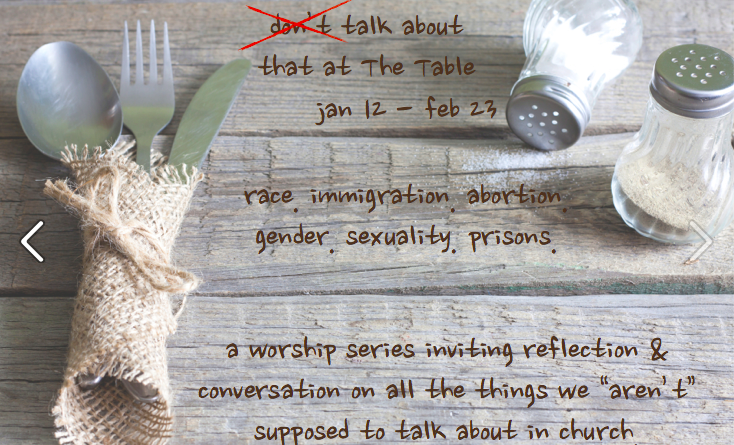We conclude our worship series, Don’t Talk About That at The Table; with reflection this coming week on prisons.
Outline
January 12: United Methodist Social Principles (Acts 10.34-43)
January 19: Race (Matthew 5.38-48)
January 26: Immigration (1 Corinthians 1.10-18)
February 2: Abortion (Micah 6.1-8)
February 9: Gender (Ephesians 5.22-24 & Galatians 3.28)
February 16: Sexuality (Romans 1.26-27 & Ruth 1.16-17)
February 23: Prisons (Hebrews 13.3)
This Sunday will invite deeper reflection on prisons. We welcome Rev. Gary McAnally to the pulpit. Gary is a United Methodist pastor who is taking a year of sabbatical leave to concentrate on Kairos Prison ministry. The mission of the Kairos Prison Ministry is to share the transforming love and forgiveness of Jesus Christ to impact the hearts and lives of incarcerated men, women and youth, as well as their families, to become loving and productive citizens of their communities.
The United Methodist Social Principles includes this statement, ¶ 164. H)… In the love of Christ, who came to save those who are lost and vulnerable, we urge the creation of a genuinely new system for the care and restoration of victims, offenders, criminal justice officials, and the community as a whole. Restorative justice grows out of biblical authority, which emphasizes a right relationship with God, self, and community. When such relationships are violated or broken through crime, opportunities are created to make things right.
Most criminal justice systems around the world are retributive. These retributive justice systems profess to hold the offender accountable to the state and use punishment as the equalizing tool for accountability. In contrast, restorative justice seeks to hold the offender accountable to the victimized person, and to the disrupted community. Through God’s transforming power, restorative justice seeks to repair the damage, right the wrong, and bring healing to all involved, including the victim, the offender, the families, and the community. The Church is transformed when it responds to the claims of discipleship by becoming an agent of healing and systemic change.
What is your experience of our criminal justice system? What difference might a restorative justice system as opposed to a retributive justice system make in our community?
Read Hebrews 13.3
How do you respond to the challenge to remember those who are in prison?


0 Comments